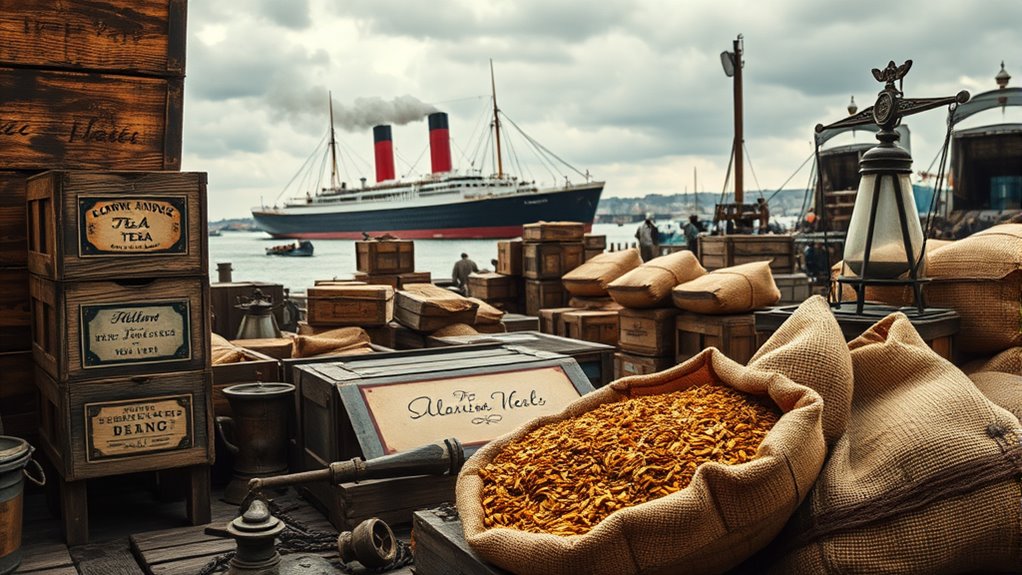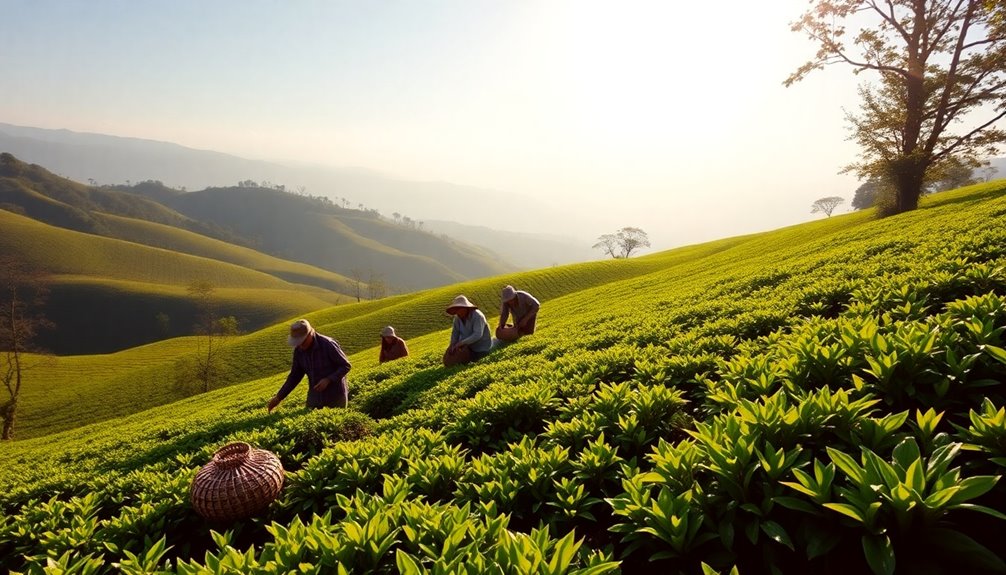History shows that tea trade sanctions don’t just disrupt economies—they also wipe out cultural practices and traditions tied to tea. These policies can cause long-lasting harm to communities, leading to poverty and loss of heritage. Modern trade ideas should remember that sanctions have deep social and cultural consequences, not just economic ones. If you continue exploring, you’ll see what lessons today’s policies can learn from the past.
Key Takeaways
- Historical tea sanctions reveal how trade restrictions can disrupt cultural traditions and local livelihoods, highlighting the importance of considering social impacts.
- Sanctions often stem from geopolitical conflicts, demonstrating the need for strategic diplomacy that balances economic goals with cultural preservation.
- Economic consequences include reduced exports and increased poverty in tea-producing regions, emphasizing the long-term harm of trade restrictions.
- The cultural erosion caused by sanctions underscores the importance of protecting intangible heritage and traditional practices amid trade disputes.
- Modern policies should account for social and cultural dimensions to avoid unintended negative effects on communities involved in global trade.

Tea trade sanctions are measures imposed by governments or international bodies to restrict or regulate the import and export of tea products. These sanctions often arise from political disputes, trade disagreements, or efforts to exert economic pressure on targeted nations. When you examine the history of these sanctions, you’ll see that their effects go far beyond just trade figures. They substantially influence cultural practices and economic stability. For many regions, tea isn’t just a commodity; it’s woven into the social fabric and daily routines. When sanctions disrupt trade, they can erode these cultural traditions, leading to a loss of identity and heritage. For instance, communities that have cultivated and cherished specific types of tea for generations might see their traditional ways of life threatened as access to certain markets diminishes or stops altogether. This cultural impact isn’t just symbolic—it affects community cohesion and the transmission of customs and knowledge. Additionally, the disruption of trade can hinder the preservation of traditional tea cultivation methods, which are often passed down through generations and are vital to cultural identity.
On the economic front, sanctions often produce immediate and tangible consequences. Countries that rely heavily on tea exports face declining incomes, job losses, and economic instability. When trade restrictions are imposed, you’ll find that supply chains are disrupted, leading to shortages and increased prices for consumers. Small farmers and local producers, who depend on export markets, may find themselves pushed into poverty or forced to abandon tea cultivation altogether. Conversely, sanctioned countries might try to develop alternative markets or boost domestic consumption, but these efforts often fall short of compensating for lost trade opportunities. The ripple effects can slow economic growth, reduce government revenues, and destabilize entire regions. Furthermore, international companies caught in the middle may face legal and financial repercussions, further complicating the economic landscape.
Understanding these historical lessons helps you see that sanctions are never just about economic leverage—they also reshape cultures and communities. While governments may impose sanctions with strategic intentions, the long-term consequences often extend beyond political goals. They can deepen cultural scars and cause economic suffering that lasts for generations. As you analyze modern trade policies, keep in mind that the impacts of sanctions are complex and multidimensional. They serve as a reminder that trade isn’t just about numbers on a balance sheet; it’s about people, traditions, and livelihoods. Recognizing these lessons can help you appreciate the delicate balance required in international trade and the importance of considering both cultural and economic factors when designing or responding to sanctions.
Frequently Asked Questions
How Did Tea Trade Sanctions Influence Global Diplomatic Relations Historically?
You see, trade sanctions on tea historically heightened diplomatic tensions, forcing nations to reconsider their alliances. When countries imposed restrictions, it often led to strained relations and shifts in trade alliances, as they sought new partners or retaliated. These actions demonstrated how economic measures could influence diplomatic ties, making diplomacy more complex. Such historical lessons show that trade sanctions can both challenge and reshape global diplomacy, emphasizing the intertwined nature of economics and international relations.
What Were the Economic Impacts of Tea Sanctions on Colonial Economies?
Imagine a storm disrupting your peaceful harbor—tea sanctions did that to colonial economies. You see, they hit colonial revenue hard, causing market disruptions that stifled trade and growth. These sanctions drained colonial coffers, limiting funds for development and governance. As a result, the economy suffered, and the colonies struggled to sustain themselves. You can see how such economic pressures fueled unrest and eventually contributed to calls for independence.
How Did Consumer Markets React to Tea Trade Restrictions in the Past?
You’d see consumer markets reacting with adaptation, seeking alternatives like coffee or local beverages when tea trade restrictions hit. While initial reactions might include disappointment or protests, overall market resilience often emerges as consumers find new preferences, and suppliers innovate to meet demand. Historically, these restrictions challenged consumers but also spurred diversification, demonstrating how markets can adjust and thrive despite trade barriers.
Were There Any Unintended Consequences of Tea Trade Sanctions?
You might not realize that tea trade sanctions often led to unintended consequences, like the rise of smuggling networks that bypassed restrictions. For example, during the Boston Tea Party, smuggling increased by 30%, undermining efforts to protect the domestic industry. These sanctions sometimes backfired, strengthening illegal trade and hurting the very economies they aimed to safeguard, teaching us that enforcement can sometimes produce unpredictable, counterproductive results.
How Have Modern Economic Policies Learned From Historical Tea Sanctions?
You see, modern economic policies have learned to prioritize economic resilience and diplomatic strategies, avoiding the pitfalls of past sanctions. Governments now recognize that sanctions can backfire, harming both sides. They focus on targeted measures and diplomatic engagement, instead of broad restrictions. These lessons help guarantee that sanctions support political goals without damaging long-term economic stability or international relations, making policies more effective and less disruptive.
Conclusion
Think of the tea trade as a delicate garden, where every sanction is like a sudden frost threatening its growth. Just as a gardener learns which plants withstand the cold, you learn that sanctions can shape economic landscapes—sometimes fostering resilience, other times causing decay. Remember, in this garden of global trade, patience and understanding help navigate the seasons of change, ensuring the roots of commerce remain strong even when storms threaten to wither the leaves.










